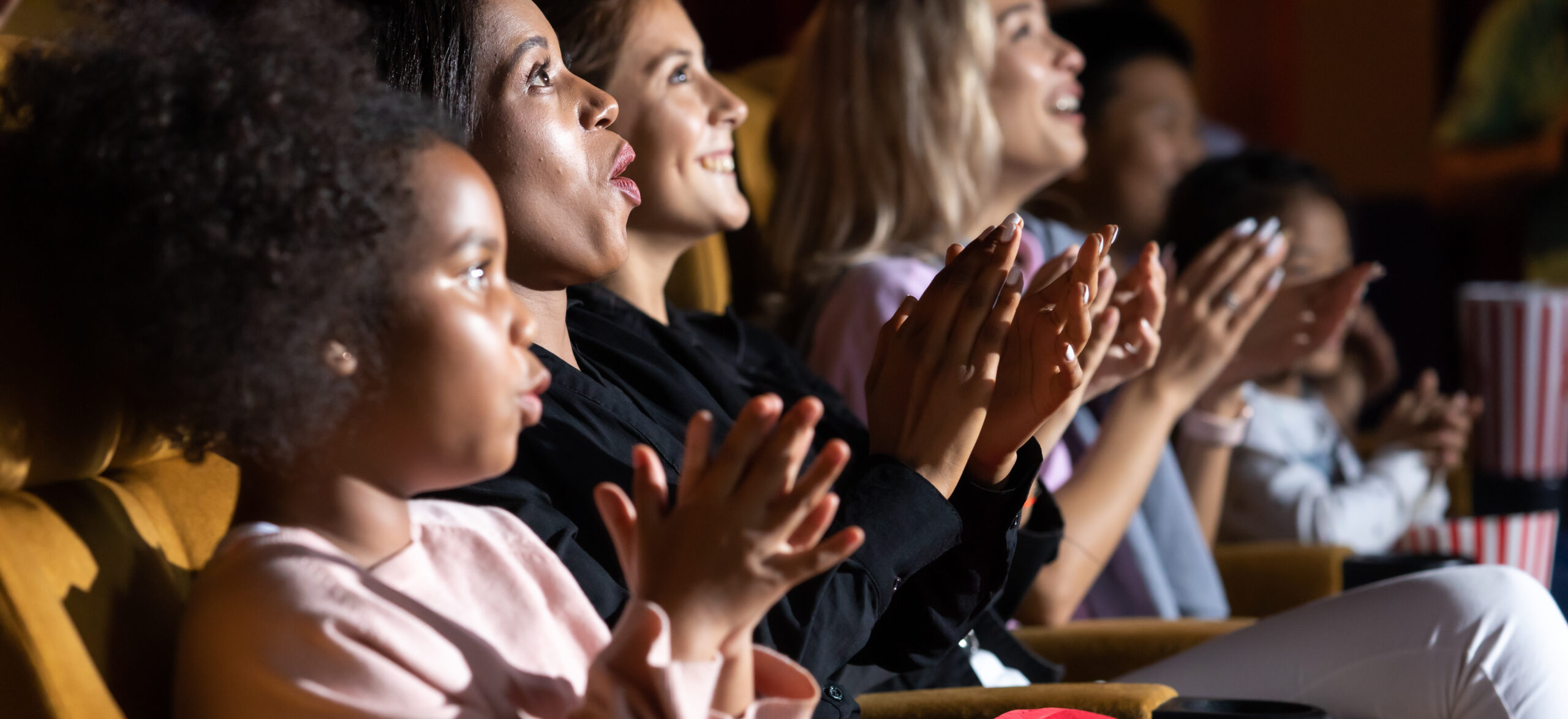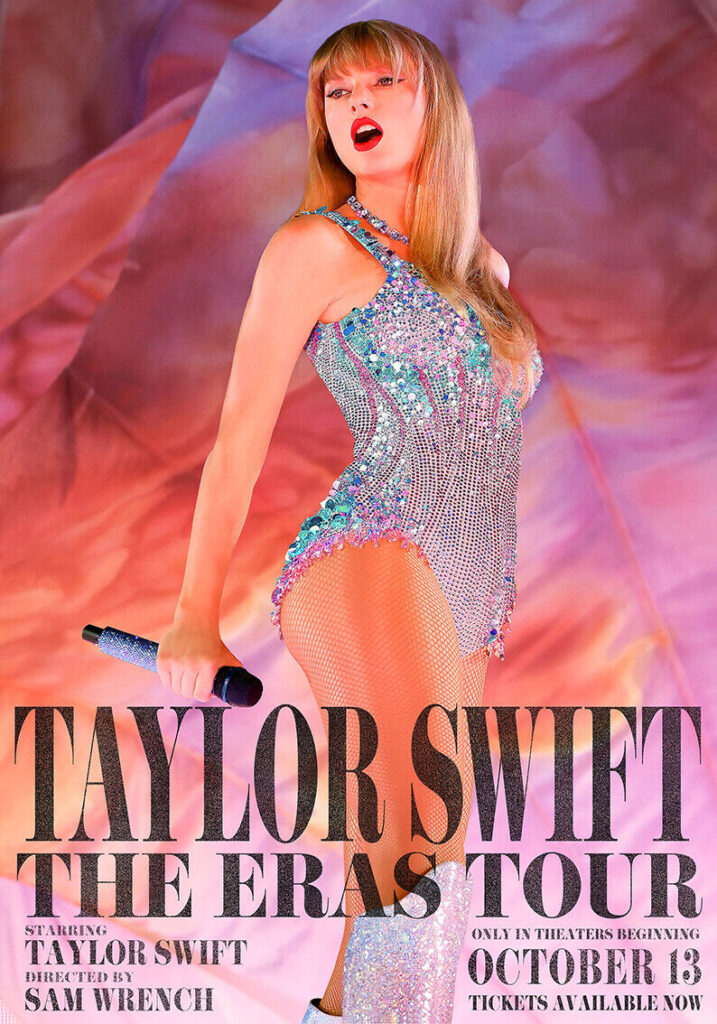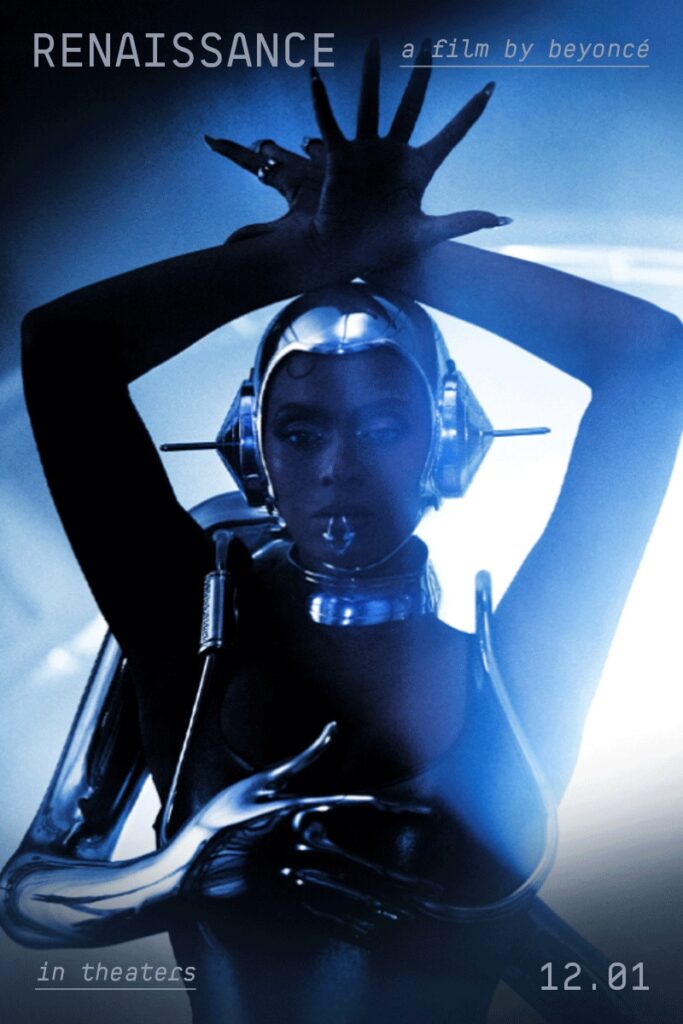
In 2023, concert lovers won. In a refreshing change of pace, free outdoor music performances in public places, like the more than 650 shows presented in towns and cities across the country throughout the Levitt network, weren’t the only spaces for live music lovers of varied socioeconomic backgrounds to foster connections while experiencing the arts. In recognition of Women’s History Month, we’re looking back at how two of pop culture’s biggest global music stars—two fearless women—fashioned their record-breaking 2023 concert tours into feature films accessible to a wide range of folks. Yup, we’re talking about Beyoncé and Taylor Swift.
Grossing over $300 million total at the box office and garnering phenomenal reviews, Taylor Swift: The Eras Tour and Renaissance: A Film by Beyoncé were unabashed commercial and critical successes. Less frequently noted, however, is how these films fostered connectedness amongst super fans who, last October through December, showed up to movie theaters nationwide, ready to mix, mingle, dance, and sing along to their favorite musician’s live performance… all from the convenience of their local cinema.
Concert films aren’t newfangled concepts, of course. The earliest popular-music concert films manifested in the late 20th century, around the time Pink Floyd released their iconic Live at Pompeii movie in 1972. Today, pop concert films are commonplace. Indeed, The Eras Tour and Renaissance weren’t even Beyoncé and Swift’s first box-office rodeos—both artists had already released multiple concert films years prior. And yet the theatrical releases of The Eras Tour and Renaissance, both debuting in fall 2023, shaped an unprecedented cultural moment: one in which the power of fostering community through accessible “live” music experiences via the cinema took front and center.

Advertising materials for ‘Taylor Swift: The Eras Tour,’ such as this poster, work to capture the energy of the live concert and foreground the visceral nature of the experience moviegoers could expect in the movie theater.
At the Levitt Foundation, we’re delighted that these films have sparked a mainstream dialogue about building community through music. After all, our conviction—that experiencing free live music together strengthens the social fabric of America—is what inspires us to support dozens of nonprofits to present high-caliber concerts in towns and cities across the country, bringing together people of all walks of life to create a sense of connection with each other and the physical place they call home.
In many ways, Swift and Beyoncé’s 2023 concert films have served a similar purpose. Billboard journalist Kyle Denis notes that Renaissance is “as much about the enigmatic artistic genius [of Beyonce] as it is about community,” highlighting that movie-going attendees are an integral part of that equation. Similar commentary swirled about The Eras Tour: Numerous critics noted that one major reason the film was such a box office hit was that the marketing surrounding both the concert tour and the film emphasized the magic of communal experiences. As shown in social media videos shared by Swifties of all walks of life, the average Eras Tour film showing was defined by groups of fans savoring the joy of live music in ways not unlike those who attended the actual stadium concerts: Movie-going Swifties also danced hard, sang loud, shined their smartphone flashlights, and shed happy tears alongside not only their best friends but new ones, too. Further fostering connectedness was the fact that both Swift and Beyoncé themselves encouraged audiences to show up in themed attire—sparkly, silver get-ups for Renaissance and friendship bracelets and outfits inspired by Swift’s ten albums for The Eras Tour.
In other words, the films’ screenings also doubled as social bonding opportunities quite like the live concerts themselves. Critics, attendees, and Swift herself all regarded the screenings of her tour to be an affirming atmosphere for female audiences, in particular. The Wrap reported that over 76% of The Eras Tour attendees were multigenerational female movie-goers—many of whom were mothers and daughters, sisters, or best friends excitedly embracing the opportunity to relate to one another through the concert film experience.
Beyoncé’s concert film, released just weeks later, followed suit. Paying homage to Black dance music styles like house and disco, along with fashion, choreography, and art aesthetics borrowed from queer and trans communities of color, the Renaissance film—an extension of Beyoncé’s 2022 dance album of the same name—acted as a point of connection for countless Beyoncé fans, particularly those in the Black and LGBTQ+ communities. Like the stadium concerts, the convivial ambiance of the Renaissance movie screenings created a sense of belonging for marginalized communities.
Many attendees also regarded Renaissance showings to be safe spaces for these marginalized groups to express their most authentic selves. At the Levitt Foundation, this embrace of inclusivity speaks to our core. Just as Renaissance is reflective of Black and queer joy and the cultural contributions of the Black and queer communities, Levitt stages across America celebrate the diversity of the communities they reflect by offering cultural programming that fosters joy, healing, and connection for people of all ages and all backgrounds—places for people of all identities and cultures to experience the elation of live music in a safe, welcoming setting.

Similar to the poster for ‘Taylor Swift: The Eras Tour’ advertising materials for ‘Renaissance: A Film By Beyoncé,’ like this film poster, aim to capture the atmosphere of the concert tour and provide movie-goers with an idea of what the movie may bring.
Perhaps the most inspiring commonality between Renaissance and The Eras Tour films was that, by nature, the overwhelming commercial success of both films represents a bold and joyous testament to the power of and demand for inclusive and accessible live music experiences. Securing tickets to the Eras Tour was reportedly a challenge for thousands of fans: ticket sales websites continually crashed; fans who couldn’t wait in the virtual queue due to other commitments, like school or work, missed out altogether; resale prices were exorbitant; and many fans couldn’t afford the original ticket prices to begin with. Similar issues arose with Renaissance concert ticket sales: both original and resale tickets, often priced at several hundred dollars, were inaccessible to many fans.
At the Levitt Foundation, we know Swift and Beyoncé fans aren’t the only ones often unable to enjoy arts experiences due to socioeconomic inequities in American society. Along with ticket prices, issues like transportation, travel expenses, and even work schedules can prohibit the average person from attending a live concert, which is why all Levitt concerts are completely free, typically take place on weekends, and come to life in outdoor public spaces accessible to a wide range of socioeconomic groups.
Likewise, by transforming their traditional concerts into vicarious live music experiences hosted at AMC Theatres, these two female globetrotters made their art easier to enjoy. Movie tickets may not be free, but they are far more affordable than the price of concert tickets. Plus, movie theaters themselves are more accessible; repeat showings and widespread locations allowed for community members in even smaller locales to experience Renaissance and The Eras Tour in a way that made sense for them.
From fostering joy and connectedness through music to building live music experiences that are more inclusive by design, Beyonce and Swift are showing that accessible music and arts experiences are the key to strengthening human connections. And if there’s one thing these two empowered pop queens have in common with Levitt’s mission, it’s a clear belief that live music experiences, including those captured on film, are joyous opportunities to celebrate our shared humanity and drive positive change in our world.
